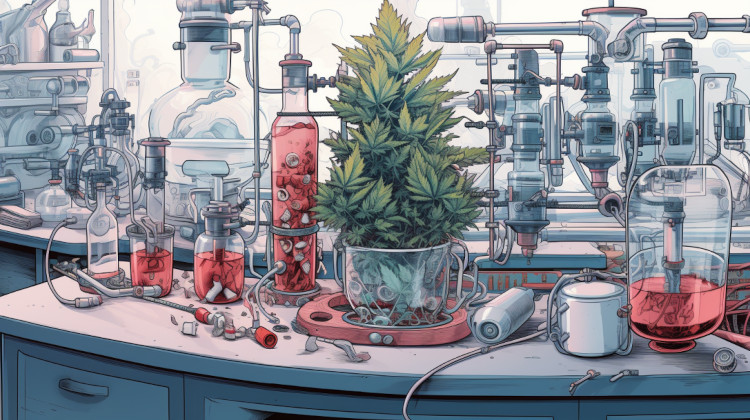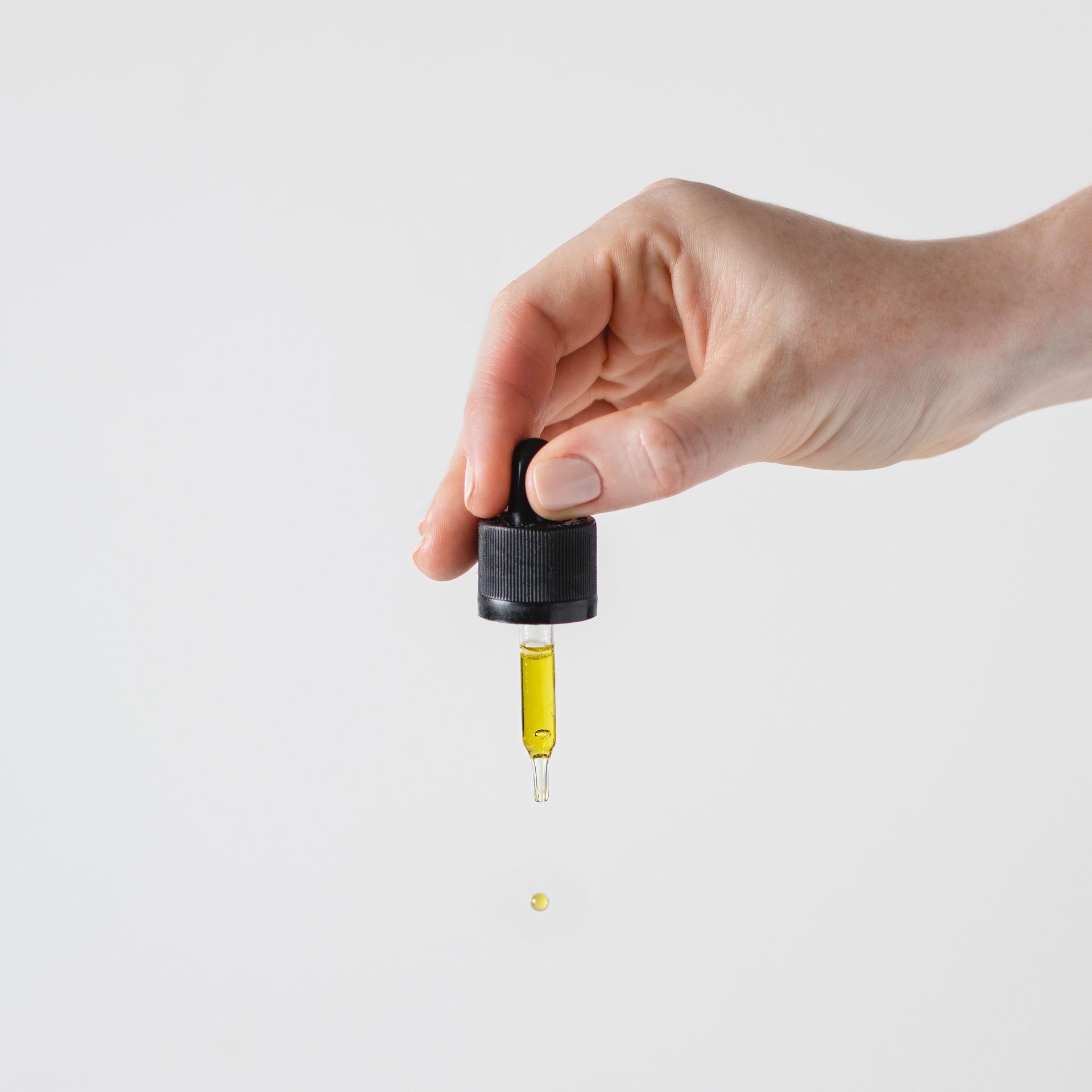In This Article
- What is HHC?
- What is HXC?
- HHC vs THC: How Are They Different?
- What are the Effects and Benefits of HHC / HXC?
- HHC / HXC Potential Risks and Side Effects
- HHC / HXC vs Other Cannabinoids
- HHC / HXC Products
- HHC / HXC Dosage and Applications
- Is HHC / HXC legal?
- Where is HHC / HXC illegal?
- Does HHC show up on a drug test?
- Is HHC / HXC more potent than THC?
- Is HHC / HXC natural?
- References
In recent years, all the major cannabinoids have made their way into the limelight – THC, CBD, CBG, and all their acid forms. Now, as legalization sweeps the nation, for both hemp and high-THC cannabis, science is learning more about all the remaining minor cannabinoids, of which there are hundreds.1
The robust world of cannabinoids can be challenging to keep track of and even more complicated to understand, especially for the average cannabis consumer. Research on the well-known cannabinoids is already limited due to their federally illegal status, so it’s even more challenging to understand the potential effects of the minor cannabinoids fully.
HHC, also called HXC, is one of the minor cannabinoids that has recently hit the market. While the research on how it feels when consumed is limited, some people report that it may be more potent than THC.
What is HHC?
HHC is short for hexahydrocannabinol. Although it is produced naturally in the cannabis plant, it is often not found in detectable levels. Its popularity has most likely increased over the years because it can be derived from CBD, making it a semi-synthetic cannabinoid in the same legal gray area as delta-8 at the federal level.
Despite its recent increase in availability, clinical studies on how HHC affects the body aren’t readily available. An older study from 1977 on mice suggested that HHC has pain-relieving properties.2
Researchers at The European Monitoring Centre for Drugs and Drug Addiction (EMCDDA) put together one of the most extensive reviews of HHC available to the general public. They note that the cannabinoid first entered the US market in September 2021, a long time from its original scientific documentation in 1940.
These researchers came to a few conclusions about HHC. First, the chemical structure is similar to THC, and when tested on animals, it showed comparable effects. Next, the conversion process creates two compounds (9R)-HHC and (9S)-HHC. The other is that there have been no studies on humans, and there seems to be no documented legitimate use for the cannabinoid.3
What is HXC?
Some companies have HXC listed as one of the cannabinoids in their product, and there has been recent confusion on what exactly it is. Many people wonder if it’s equivalent to or different from HHC.
The answer is no: HXC is not a different cannabinoid. HXC is an interchangeable acronym for HHC. They are the same cannabinoid. The difference is just a matter of rebranding that a select few companies have started. Why that happens remains unclear.
HHC vs THC: How Are They Different?

What is understood about HHC is extremely limited, and there is a significant difference between it and THC. Researchers know its chemical structure is similar but slightly different from delta 9-THC’s.4 While they are both found in the cannabis plant, there is not enough HHC to extract it, so it’s derived from CBD – usually from hemp, which also means it may be available in states where only hemp is legal.
What are the Effects and Benefits of HHC / HXC?

Researchers have found that HHC induces pain-relieving effects in animal studies, although it has yet to be proven in humans. Despite the lack of research on how it affects the human body, consumers have tried these HHC/HXC products. Recent anecdotal accounts indicate that it may feel comparable to THC for some. People have used HHC/HXC for issues like boosting appetite, pain, sleep, and nausea.
While some brands boast that HHC can be more potent than THC, research has yet to confirm that. One study stated that although HHC/HXC has similar effects to THC, it is less potent with fewer therapeutic effects.5 In addition, the different types of HHCs, called isomers, produced during conversion show different activity at the CB1 receptors. (9R)-HHC has been demonstrated to bind more strongly to the CB1 receptor than its counterpart, (9S)-HHC. (9R)-HHC has been demonstrated in more than one study to have a potential pain-relieving effect.6
HHC / HXC Potential Risks and Side Effects
Since research is limited, it is unclear what the risks and side effects of consuming HHC/HXC are. It may be best to assume that the same risks of CBD and THC apply. Rachel Cristie, a researcher from EMCDDA, told Euronews Next that it’s also possible: “Contaminations either with extraction residues or synthetic by-products could pose unforeseen risks. Traces of heavy metals originating from the catalyst used for the hydrogenation might also be present.”
A recent report also analyzed the contents of over sixty HHC products and found that between 30% and 85% of products contain more of the less potent isomer (9S)-HHC.7
HHC / HXC vs Other Cannabinoids
There are a variety of new cannabinoids making their way into the market. It can be hard to decipher which one is safe or provides the effects you’re searching for. Most cannabinoids on the market, like HHC/HXC and THC-P, are semi-synthetic, meaning they are produced in cannabis but in trace amounts and are therefore derived from CBD in a lab.
There isn’t much research regarding the adverse effects of consuming synthetic cannabinoids. However, the CDC warns they may be toxic and induce nausea, vomiting, or hallucinations. There have been a few single case studies where this has happened to someone who consumed synthetic cannabinoids, and there are also cases where people benefit from consumption.
Below are a few of the most popular ones and what is known about their pros and cons to help you make an informed decision about which to consume.
| Cannabinoid | Pros | Cons |
| HHC / HXC | Semi-synthetic. There is little to no research of the effect on humans. | Anecdotal reports that it may have similar effects to THC. It may be accessible in jurisdictions where THC-rich cannabis is illegal. |
| HHC-O | Semi-synthetic. There is little to no research on the effect on humans. | It may help with ailments and symptoms related to pain, sleep, anxiety, and inflammation. Well-known and documented cannabinoid. |
| THC | Synthetic. There is little to no research on the effect on humans. | Marketed as 3x as potent as THC. It may be accessible in jurisdictions where THC-rich cannabis is illegal. |
| THC-O | Synthetic. There is little to no research on the effect on humans. | It may not be accessible to everyone. It may have adverse side effects (nausea, dizziness, anxiety). |
| THC-P | Semi-synthetic. There is little to no research on the effect on humans. | Semi-synthetic. Little to no research on the effect on humans. |
HHC / HXC Products

HHC/HXC products are available at some store-fronts and online retail stores. Still, since there is limited research to support the claims of effects or provide any insight into how they affect the body, we are unable to recommend any brand or HHC product ethically.
If you choose to buy HHC products, ensure you can access a certificate of analysis (CoA) from independent lab testing and purchase from a reputable retailer.
HHC / HXC Dosage and Applications
What HHC/HXC dosage is right for you will be highly personal. There is little to nothing known about how the semi-synthetic cannabinoid interacts with the body or other medications. That said, it’s best to start low and go slow. Remember that it may feel similar to THC, so you may feel comparable intoxicating effects.
Is HHC / HXC legal?
Since HHC/HXC is a newer cannabinoid on the market, states may not have explicit laws about the cannabinoid. Many states with legal hemp consider HHC produced from hemp to be legal.
Where is HHC / HXC illegal?
Along with other semi-synthetic cannabinoids, HHC has been banned in Alaska, Arizona, Arkansas, Colorado, Delaware, Idaho, Iowa, Kentucky, Mississippi, Nevada, New York, North Dakota, Oregon, Tennessee, Texas, Vermont, and Washington.
Does HHC show up on a drug test?
There is no scientific data to answer whether or not HHC/HXC will show up on a drug test. It does have a similar molecular structure to THC, and these products may also have THCs like delta-8, so it may be best to refrain from HHC/HXC consumption if you need to pass a drug test.
Is HHC / HXC more potent than THC?
Some publications say yes, depending on the isomer, but no human clinical research has been done to support that data.
Is HHC / HXC natural?
HHC/HXC is naturally found in the cannabis plant but in minimal, typically non-detectable concentrations. Products featuring this HHC/HXC derive it from CBD, making it a semi-synthetic cannabinoid.
References
- Walsh KB, McKinney AE, Holmes AE. Minor Cannabinoids: Biosynthesis, Molecular Pharmacology and Potential Therapeutic Uses. Front Pharmacol. 2021;12:777804. Published 2021 Nov 29. doi:10.3389/fphar.2021.777804
↩︎ - Bloom AS, Dewey WL, Harris LS, Brosius KK. 9-nor-9beta-hydroxyhexahydrocannabinol, a cannabinoid with potent antinociceptive activity: comparisons with morphine. J Pharmacol Exp Ther. 1977;200(2):263-270.
↩︎ - Ujváry I. Hexahydrocannabinol and closely related semi-synthetic cannabinoids: A comprehensive review [published online ahead of print, 2023 Jun 2]. Drug Test Anal. 2023;10.1002/dta.3519. doi:10.1002/dta.3519
↩︎ - Collins AC, Ramirez GA, Tesfatsion TT, Ray KP, Caudill S, Cruces W. Synthesis and characterization of the diastereomers of HHC and H4CBD. Natural Product Communications. 2023;18(3). doi:https://doi.org/10.1177/1934578X231158910
↩︎ - Graziano S, Varì MR, Pichini S, Busardo FP, Cassano T, Di Trana A. Hexahydrocannabinol Pharmacology, Toxicology, and Analysis: The First Evidence for a Recent New Psychoactive Substance. Curr Neuropharmacol. 2023;21(12):2424-2430. doi:10.2174/1570159X21666230623104624
↩︎ - Russo F, Vandelli MA, Biagini G, et al. Synthesis and pharmacological activity of the epimers of hexahydrocannabinol (HHC). Sci Rep. 2023;13(1):11061. Published 2023 Jul 8. doi:10.1038/s41598-023-38188-5
↩︎ - Nasrallah DJ, Garg NK. Studies Pertaining to the Emerging Cannabinoid Hexahydrocannabinol (HHC). ACS Chemical Biology. 2023;18(9). doi:https://doi.org/10.1021/acschembio.3c00254
↩︎
The information in this article and any included images or charts are for educational purposes only. This information is neither a substitute for, nor does it replace, professional legal advice or medical advice, diagnosis, or treatment. If you have any concerns or questions about laws, regulations, or your health, you should always consult with an attorney, physician or other licensed professional.




